Hand Hygiene Project: Importance of Hand Washing in Healthcare Facilities
VerifiedAdded on 2023/06/11
|20
|877
|140
AI Summary
This survey aims to study the hand washing practices of healthcare professionals in healthcare facilities. The survey reveals that HCPs wash hands often, use soap, clean water, and other antiseptics. The research findings are applicable in addressing the issues of Hospital Acquired Infections (HAIs).
Contribute Materials
Your contribution can guide someone’s learning journey. Share your
documents today.
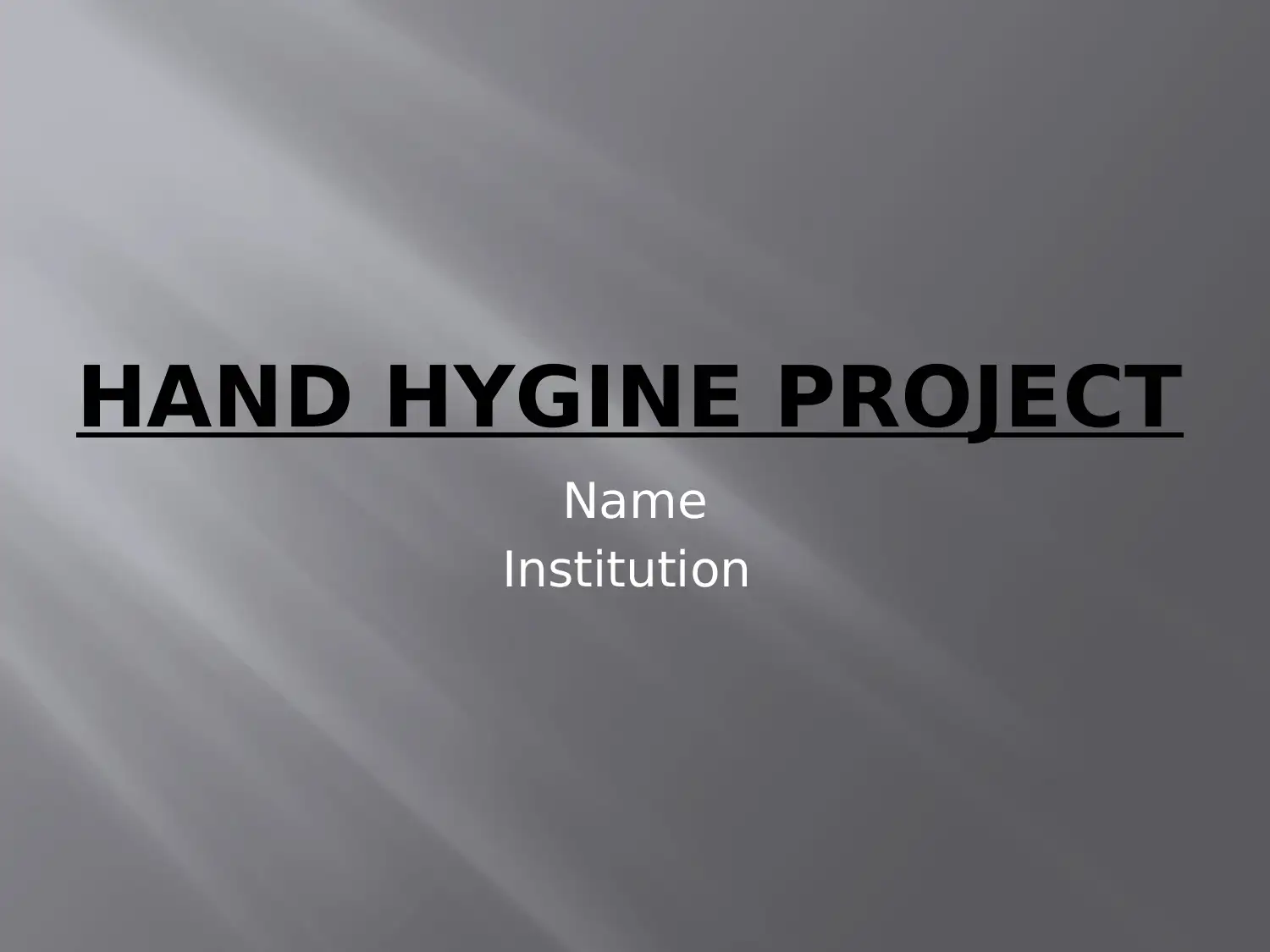
HAND HYGINE PROJECT
Name
Institution
Name
Institution
Secure Best Marks with AI Grader
Need help grading? Try our AI Grader for instant feedback on your assignments.
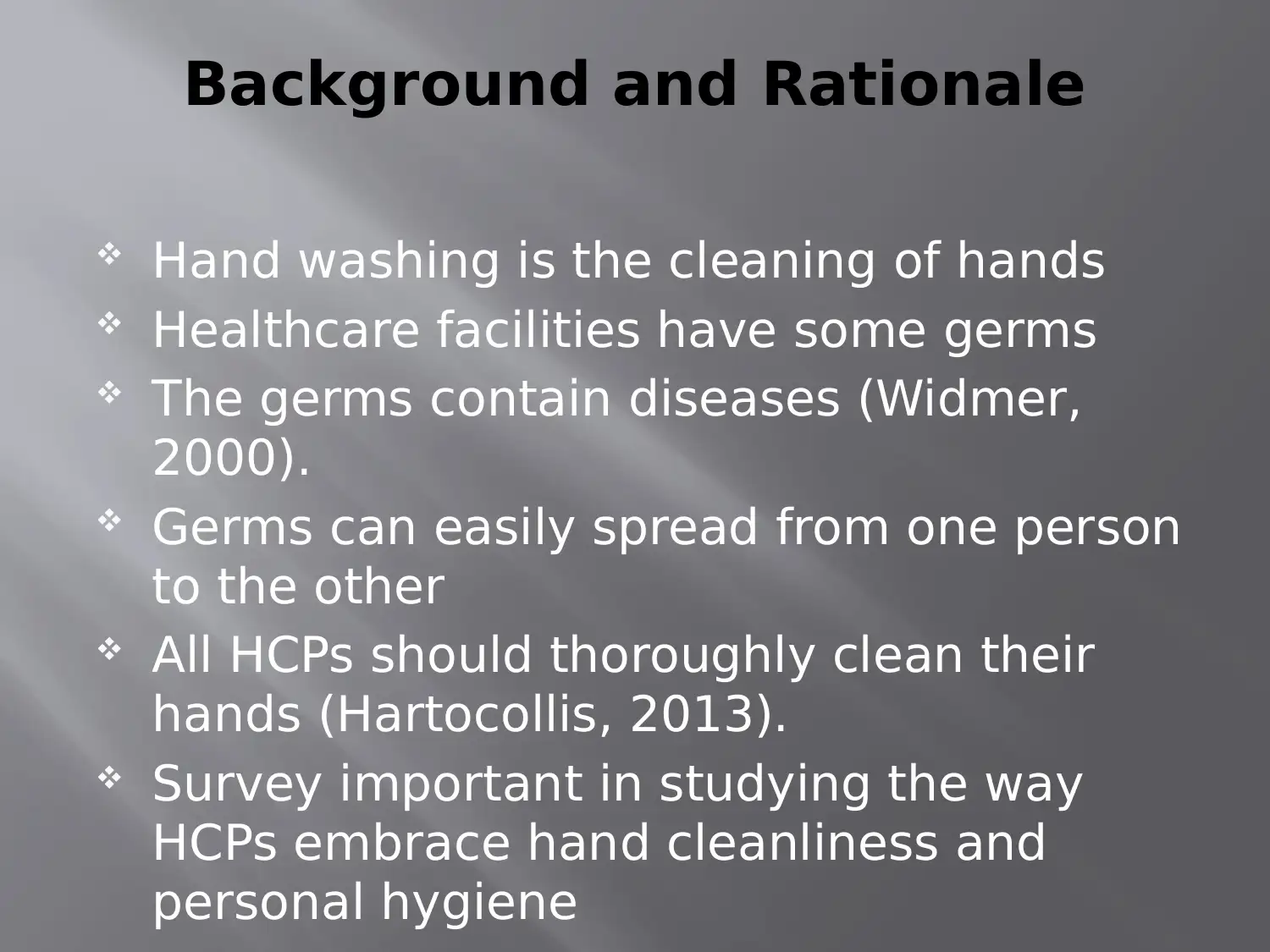
Background and Rationale
Hand washing is the cleaning of hands
Healthcare facilities have some germs
The germs contain diseases (Widmer,
2000).
Germs can easily spread from one person
to the other
All HCPs should thoroughly clean their
hands (Hartocollis, 2013).
Survey important in studying the way
HCPs embrace hand cleanliness and
personal hygiene
Hand washing is the cleaning of hands
Healthcare facilities have some germs
The germs contain diseases (Widmer,
2000).
Germs can easily spread from one person
to the other
All HCPs should thoroughly clean their
hands (Hartocollis, 2013).
Survey important in studying the way
HCPs embrace hand cleanliness and
personal hygiene
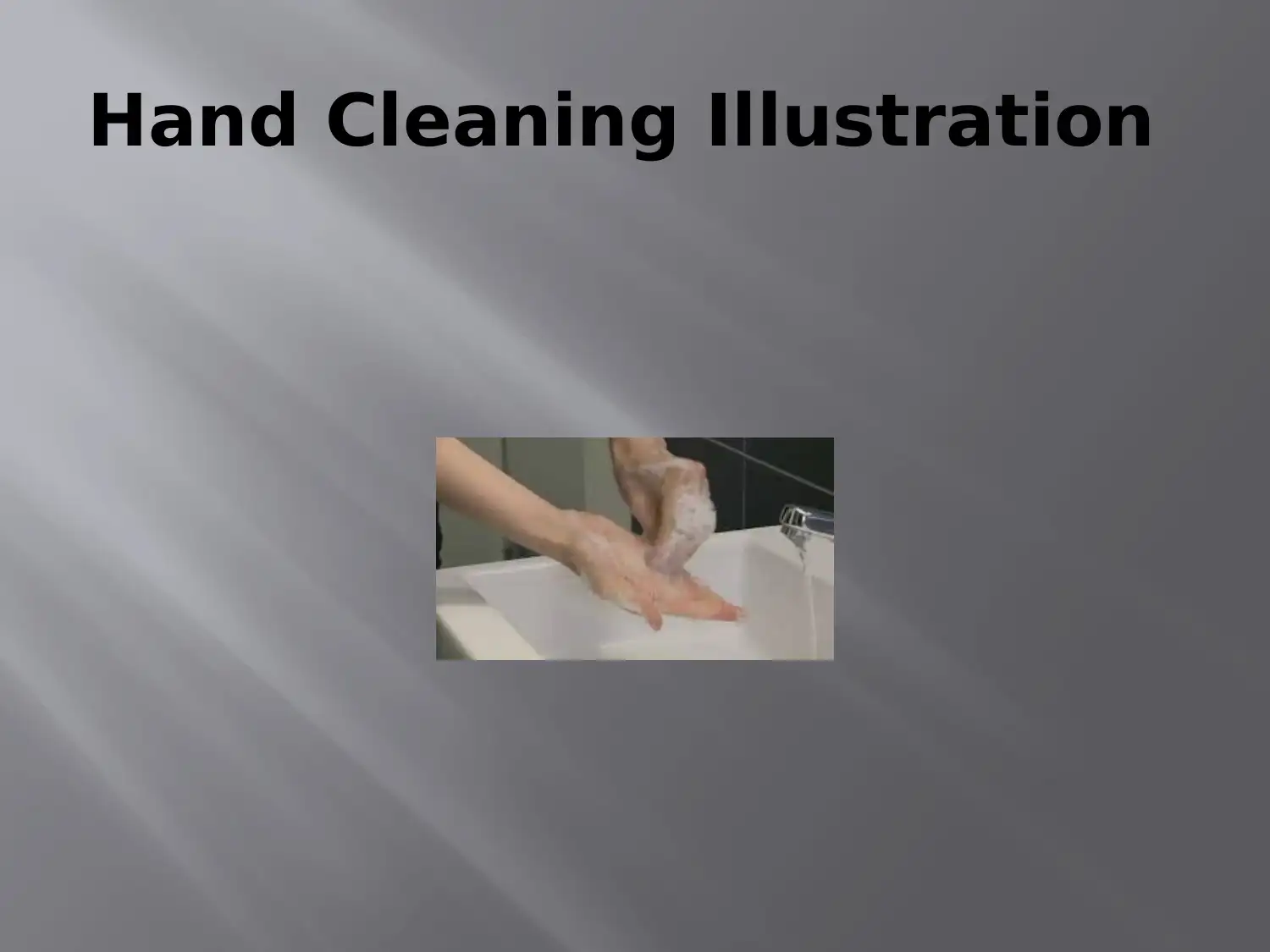
Hand Cleaning Illustration
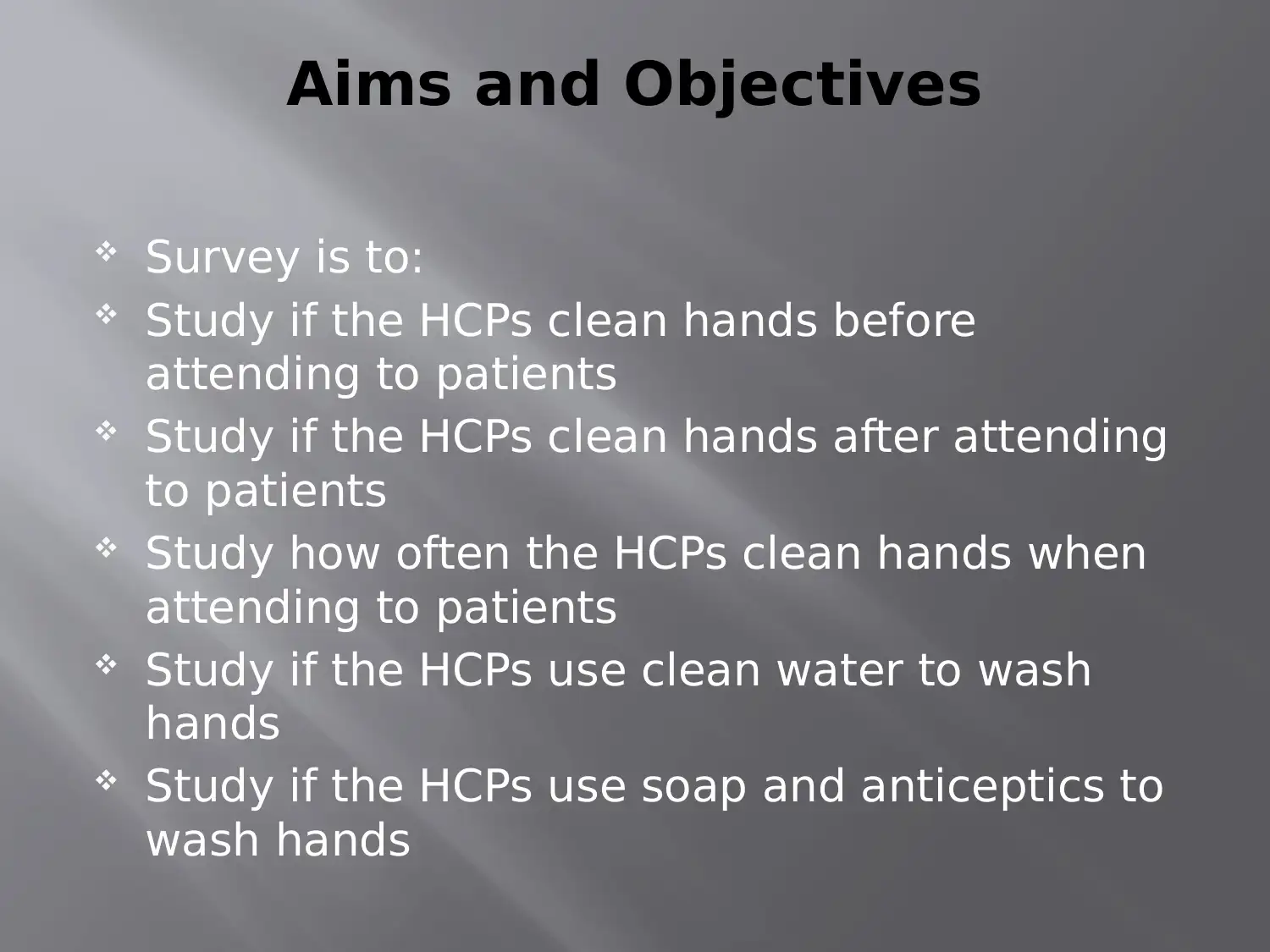
Aims and Objectives
Survey is to:
Study if the HCPs clean hands before
attending to patients
Study if the HCPs clean hands after attending
to patients
Study how often the HCPs clean hands when
attending to patients
Study if the HCPs use clean water to wash
hands
Study if the HCPs use soap and anticeptics to
wash hands
Survey is to:
Study if the HCPs clean hands before
attending to patients
Study if the HCPs clean hands after attending
to patients
Study how often the HCPs clean hands when
attending to patients
Study if the HCPs use clean water to wash
hands
Study if the HCPs use soap and anticeptics to
wash hands
Secure Best Marks with AI Grader
Need help grading? Try our AI Grader for instant feedback on your assignments.
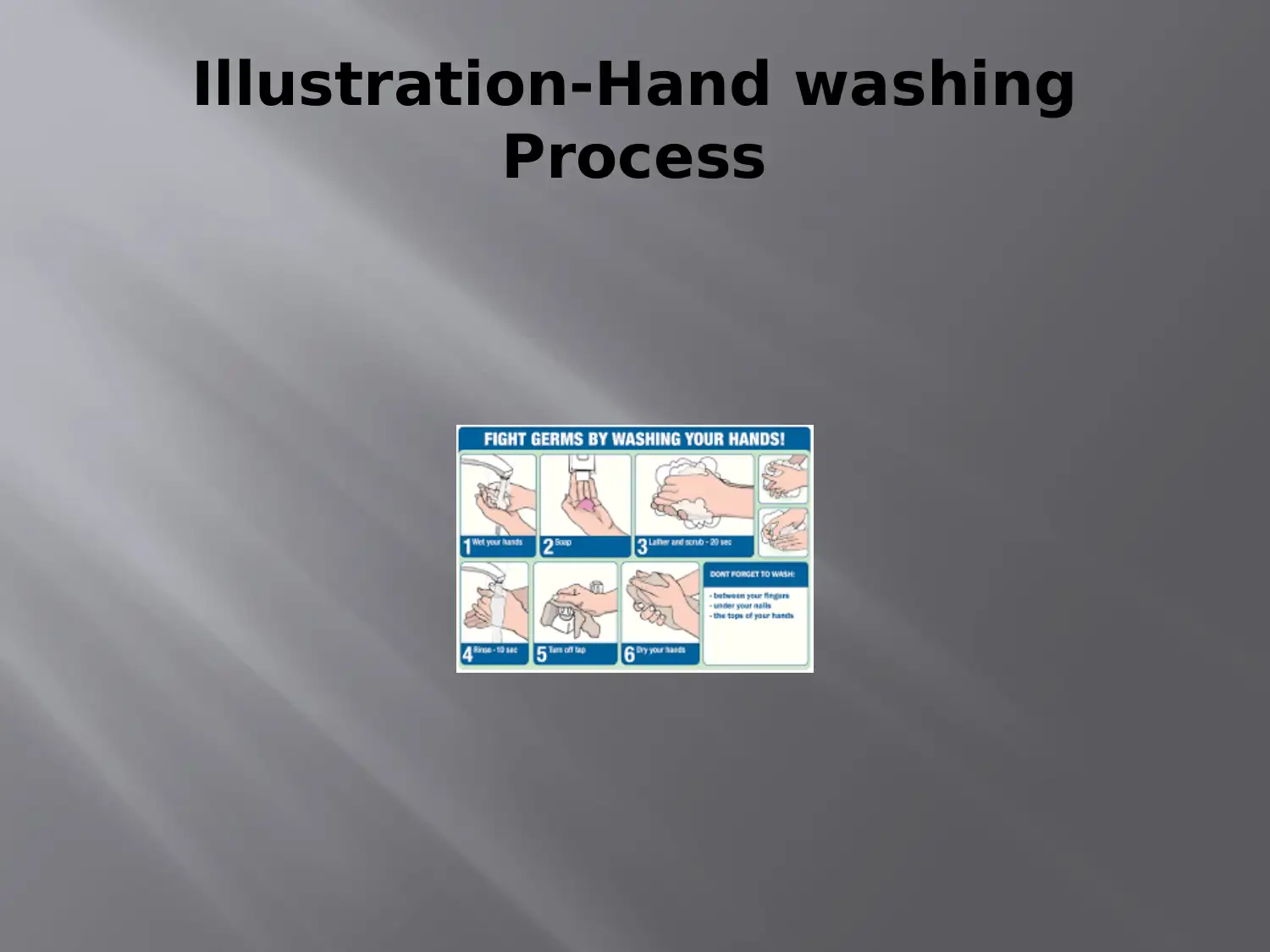
Illustration-Hand washing
Process
Process
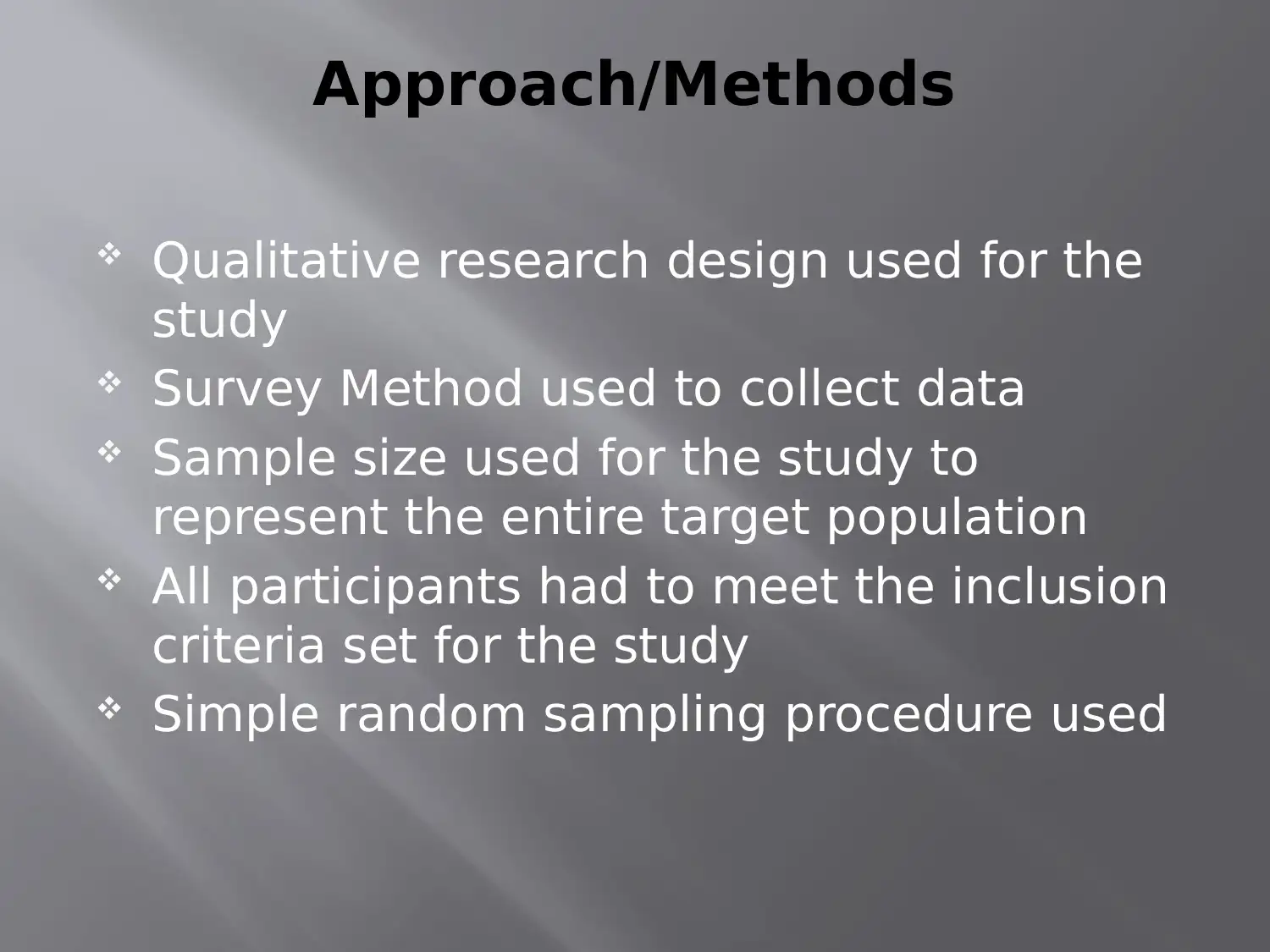
Approach/Methods
Qualitative research design used for the
study
Survey Method used to collect data
Sample size used for the study to
represent the entire target population
All participants had to meet the inclusion
criteria set for the study
Simple random sampling procedure used
Qualitative research design used for the
study
Survey Method used to collect data
Sample size used for the study to
represent the entire target population
All participants had to meet the inclusion
criteria set for the study
Simple random sampling procedure used
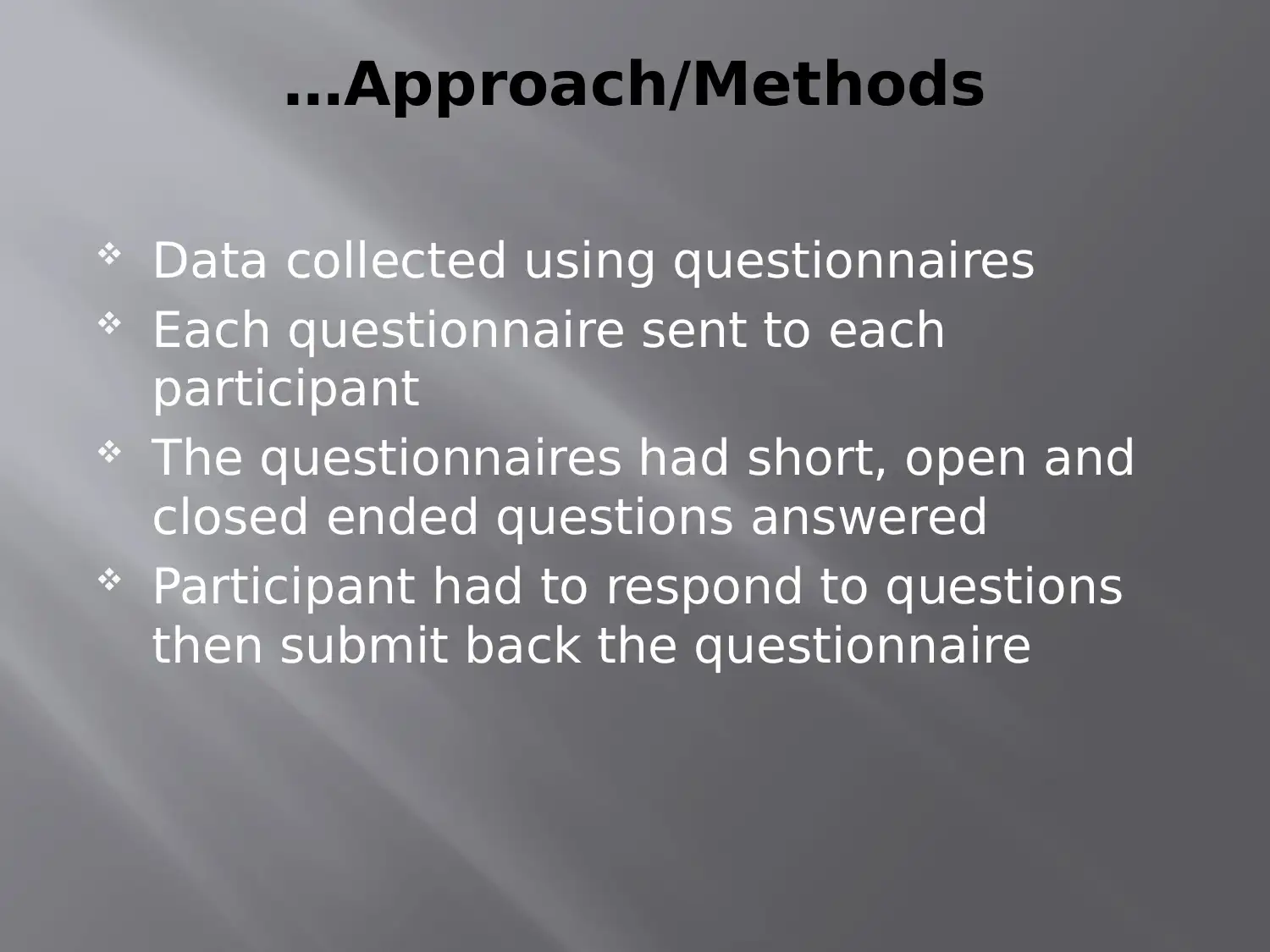
…Approach/Methods
Data collected using questionnaires
Each questionnaire sent to each
participant
The questionnaires had short, open and
closed ended questions answered
Participant had to respond to questions
then submit back the questionnaire
Data collected using questionnaires
Each questionnaire sent to each
participant
The questionnaires had short, open and
closed ended questions answered
Participant had to respond to questions
then submit back the questionnaire
Paraphrase This Document
Need a fresh take? Get an instant paraphrase of this document with our AI Paraphraser
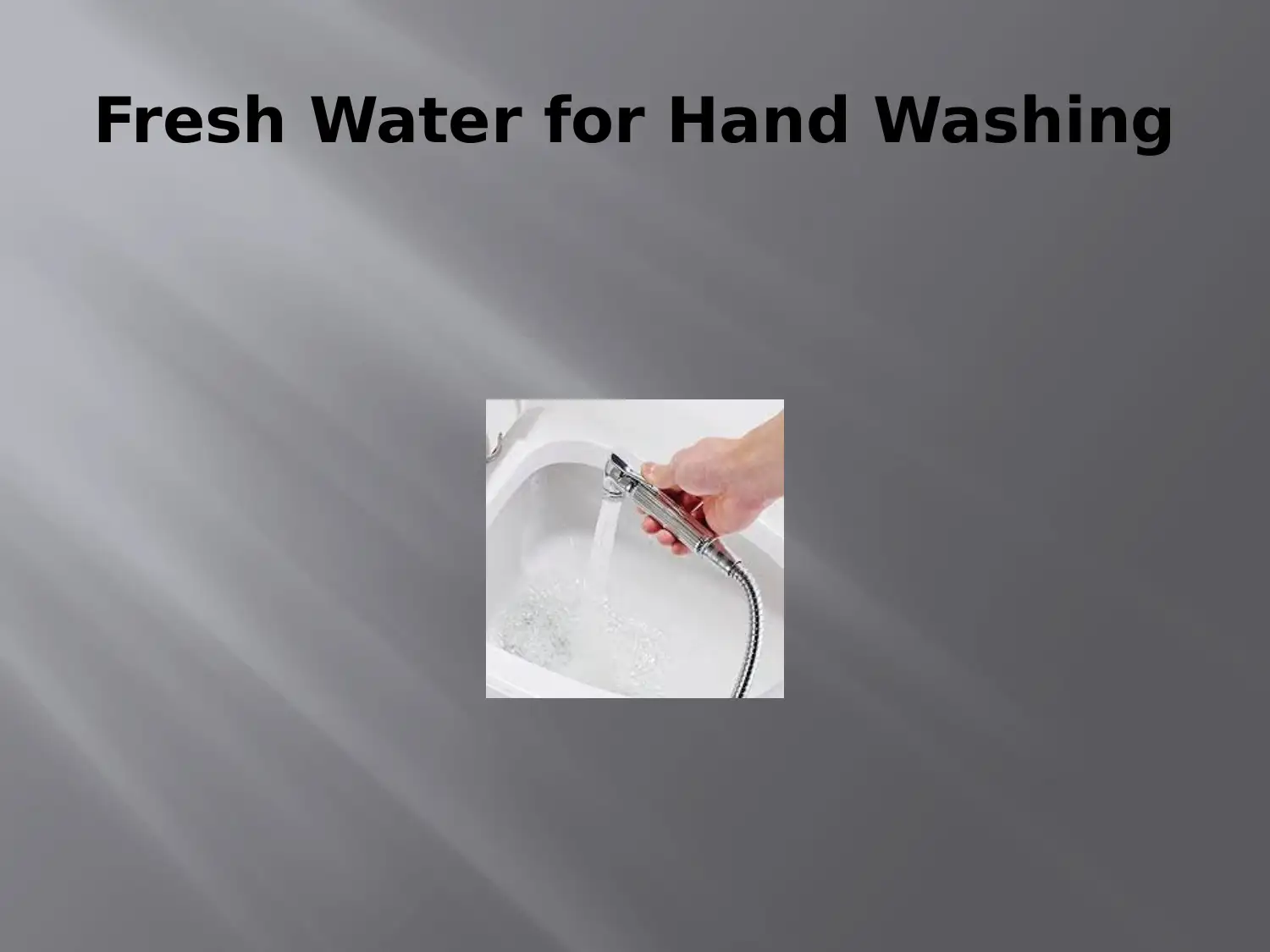
Fresh Water for Hand Washing
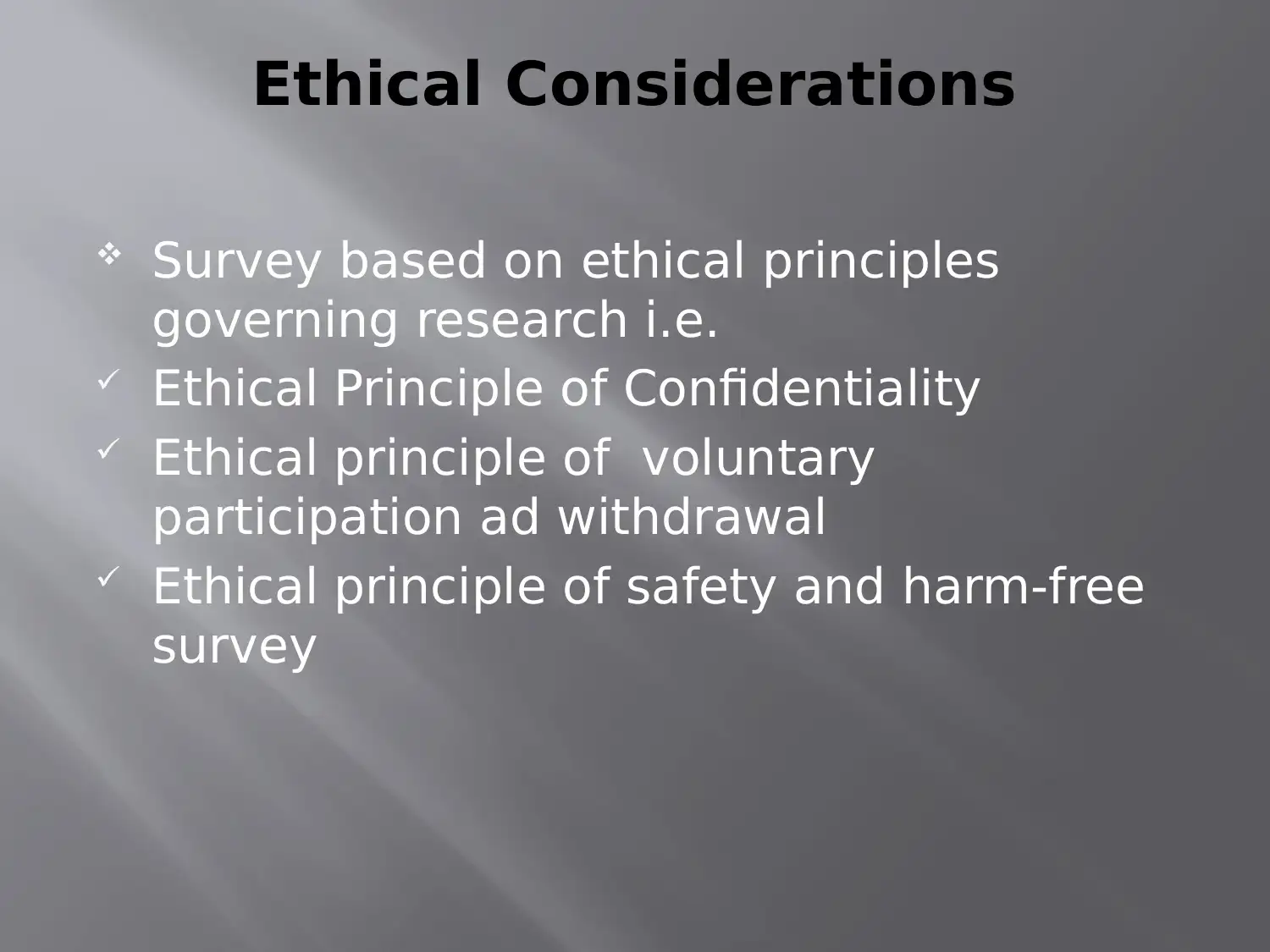
Ethical Considerations
Survey based on ethical principles
governing research i.e.
Ethical Principle of Confidentiality
Ethical principle of voluntary
participation ad withdrawal
Ethical principle of safety and harm-free
survey
Survey based on ethical principles
governing research i.e.
Ethical Principle of Confidentiality
Ethical principle of voluntary
participation ad withdrawal
Ethical principle of safety and harm-free
survey
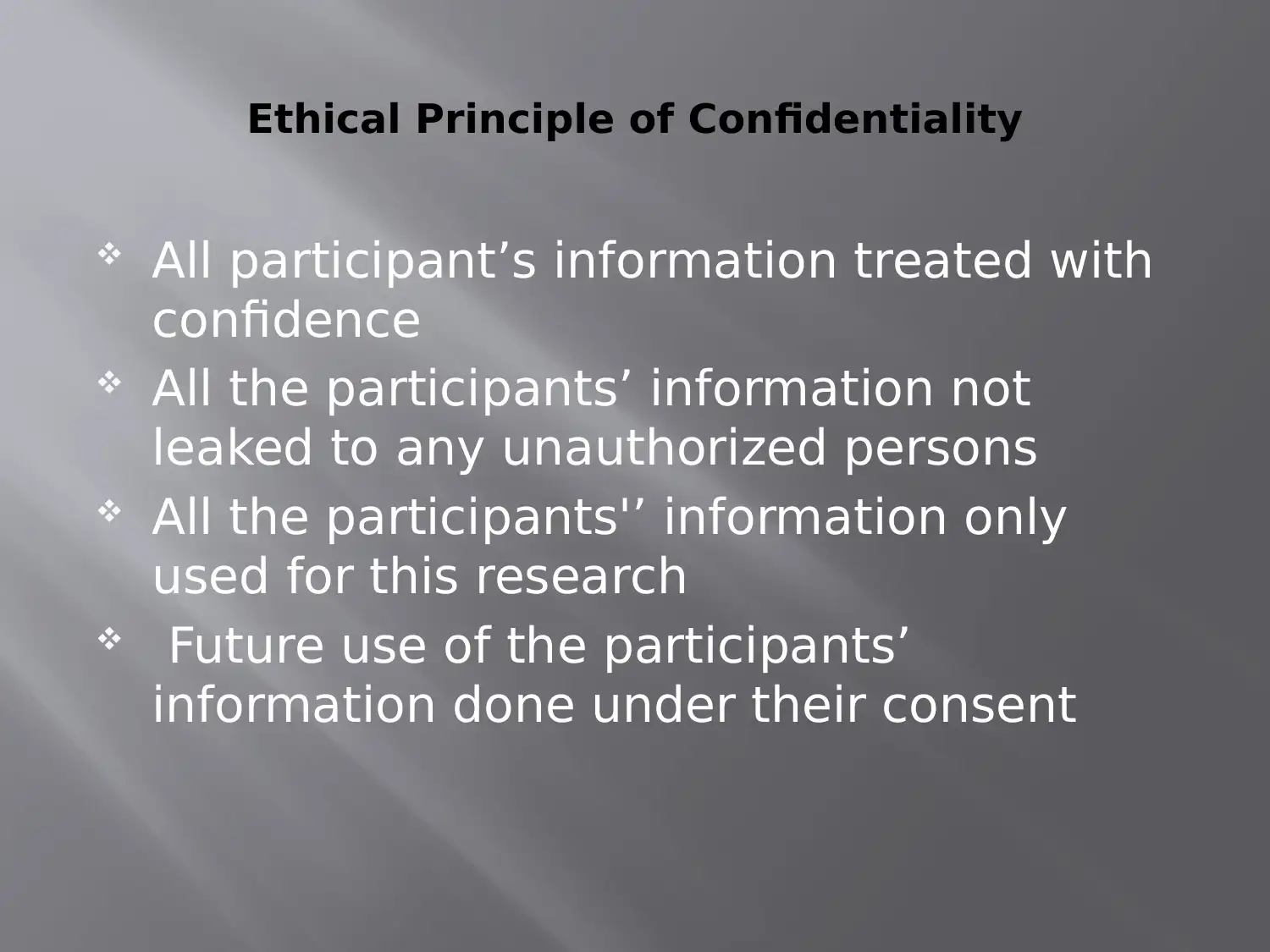
Ethical Principle of Confidentiality
All participant’s information treated with
confidence
All the participants’ information not
leaked to any unauthorized persons
All the participants'’ information only
used for this research
Future use of the participants’
information done under their consent
All participant’s information treated with
confidence
All the participants’ information not
leaked to any unauthorized persons
All the participants'’ information only
used for this research
Future use of the participants’
information done under their consent
Secure Best Marks with AI Grader
Need help grading? Try our AI Grader for instant feedback on your assignments.
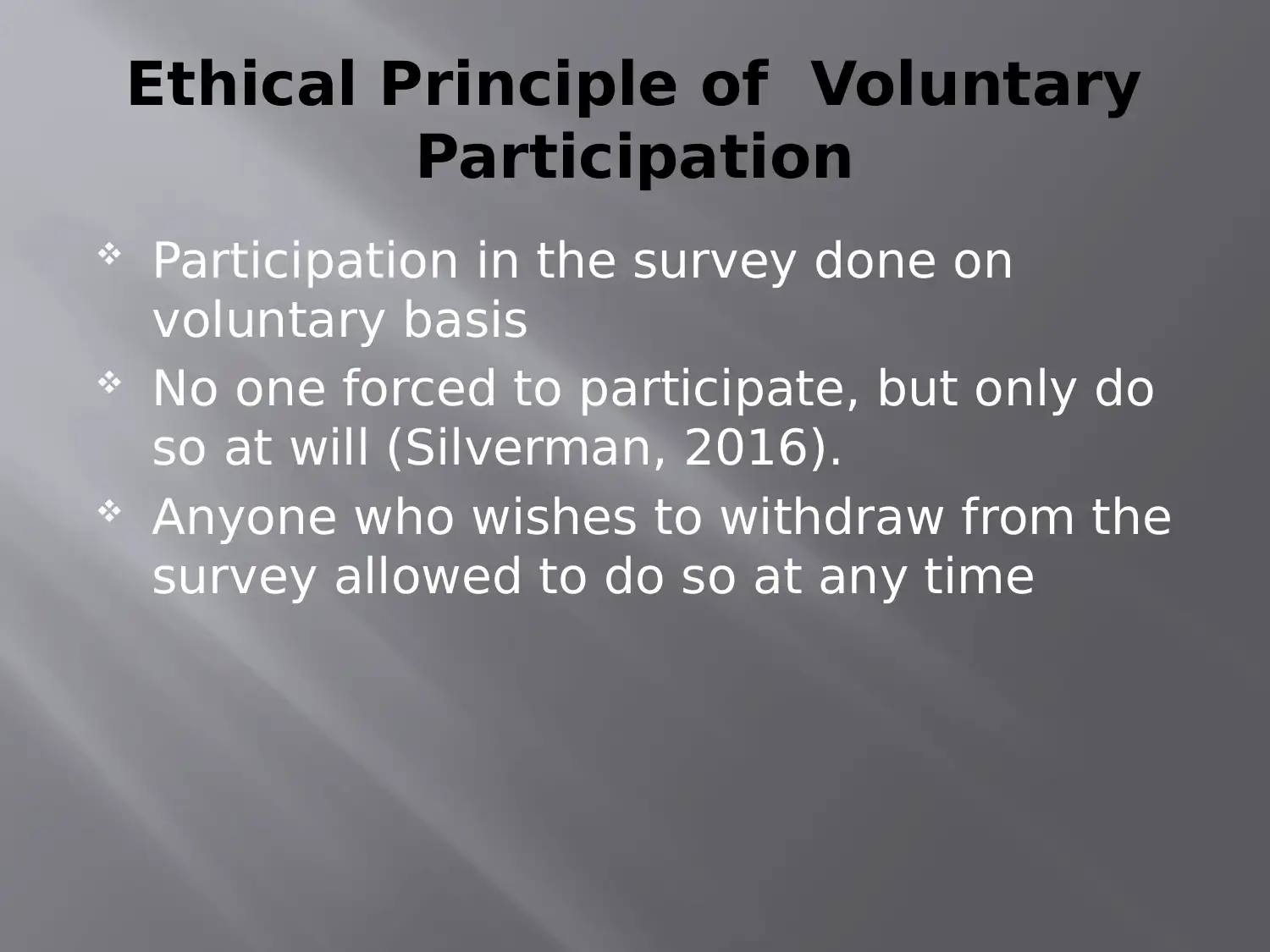
Ethical Principle of Voluntary
Participation
Participation in the survey done on
voluntary basis
No one forced to participate, but only do
so at will (Silverman, 2016).
Anyone who wishes to withdraw from the
survey allowed to do so at any time
Participation
Participation in the survey done on
voluntary basis
No one forced to participate, but only do
so at will (Silverman, 2016).
Anyone who wishes to withdraw from the
survey allowed to do so at any time
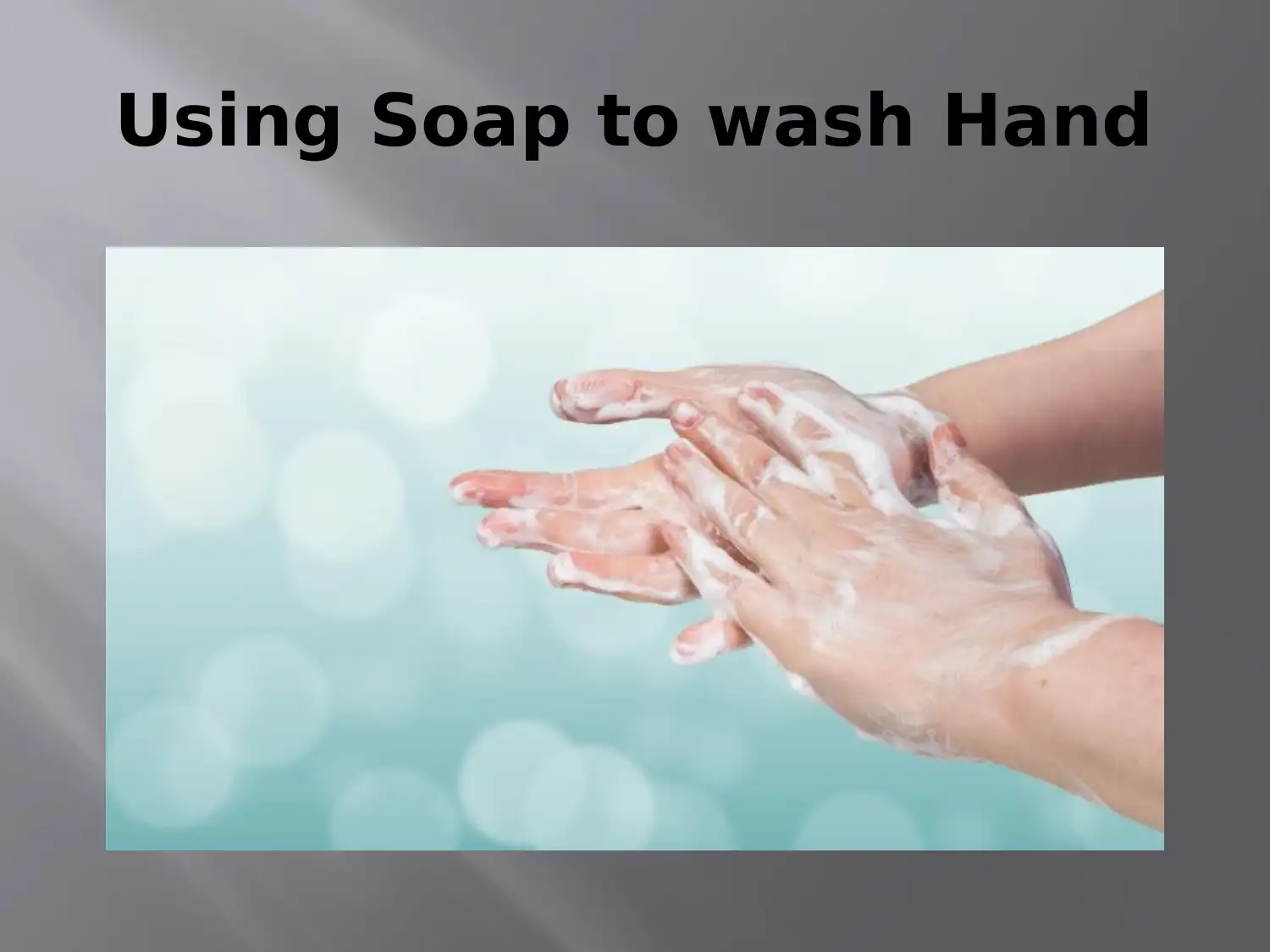
Using Soap to wash Hand
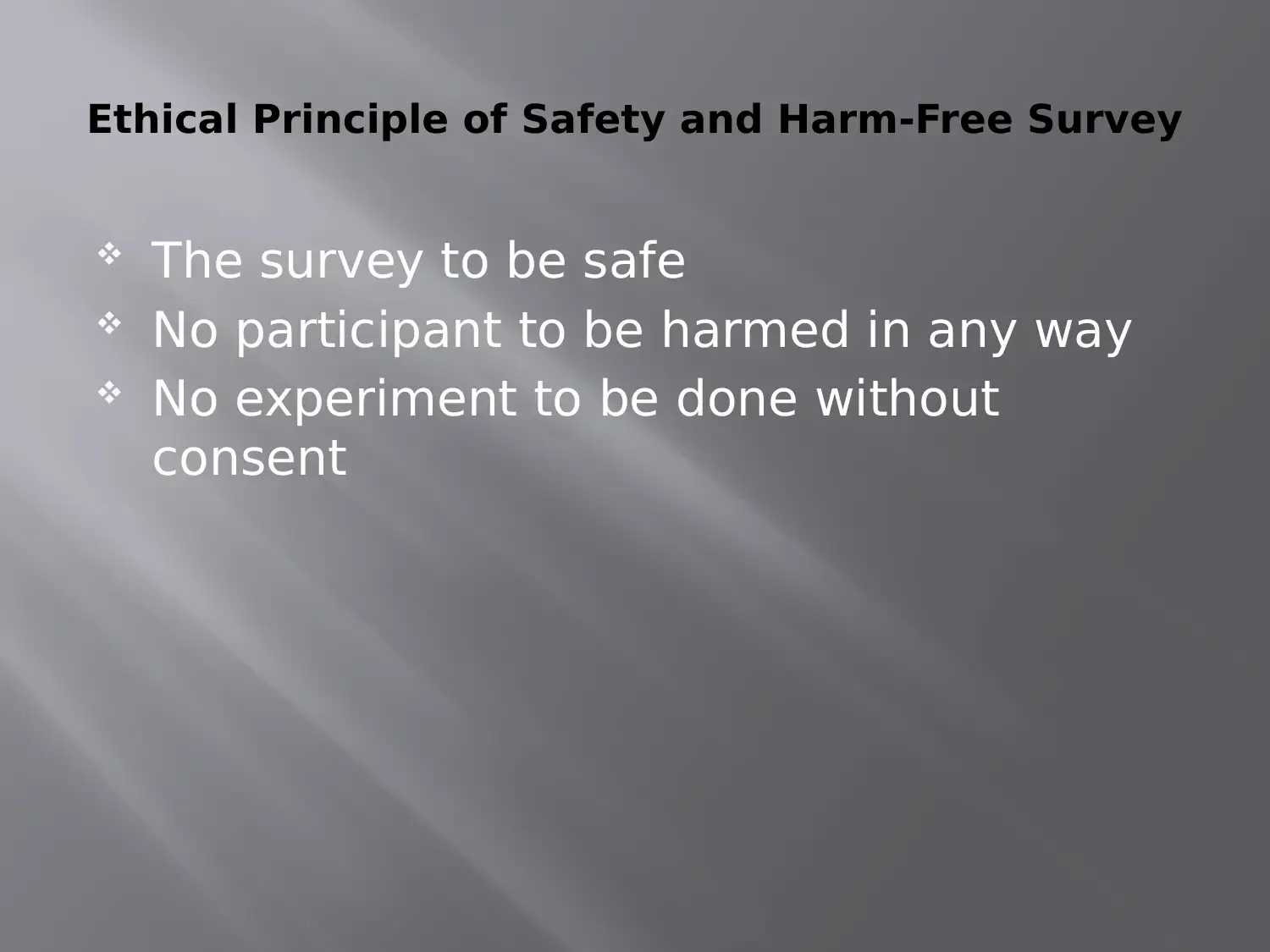
Ethical Principle of Safety and Harm-Free Survey
The survey to be safe
No participant to be harmed in any way
No experiment to be done without
consent
The survey to be safe
No participant to be harmed in any way
No experiment to be done without
consent
Paraphrase This Document
Need a fresh take? Get an instant paraphrase of this document with our AI Paraphraser
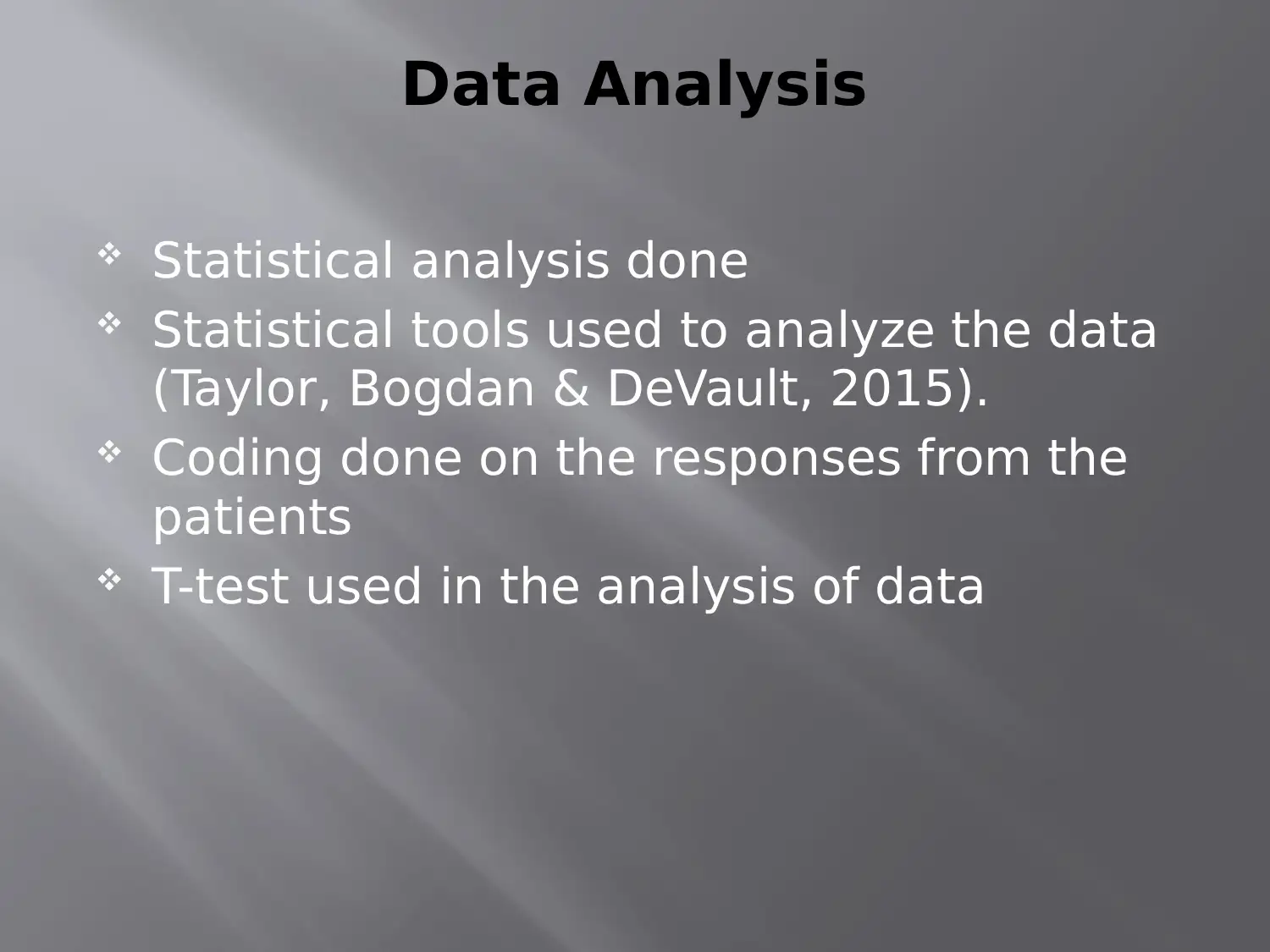
Data Analysis
Statistical analysis done
Statistical tools used to analyze the data
(Taylor, Bogdan & DeVault, 2015).
Coding done on the responses from the
patients
T-test used in the analysis of data
Statistical analysis done
Statistical tools used to analyze the data
(Taylor, Bogdan & DeVault, 2015).
Coding done on the responses from the
patients
T-test used in the analysis of data
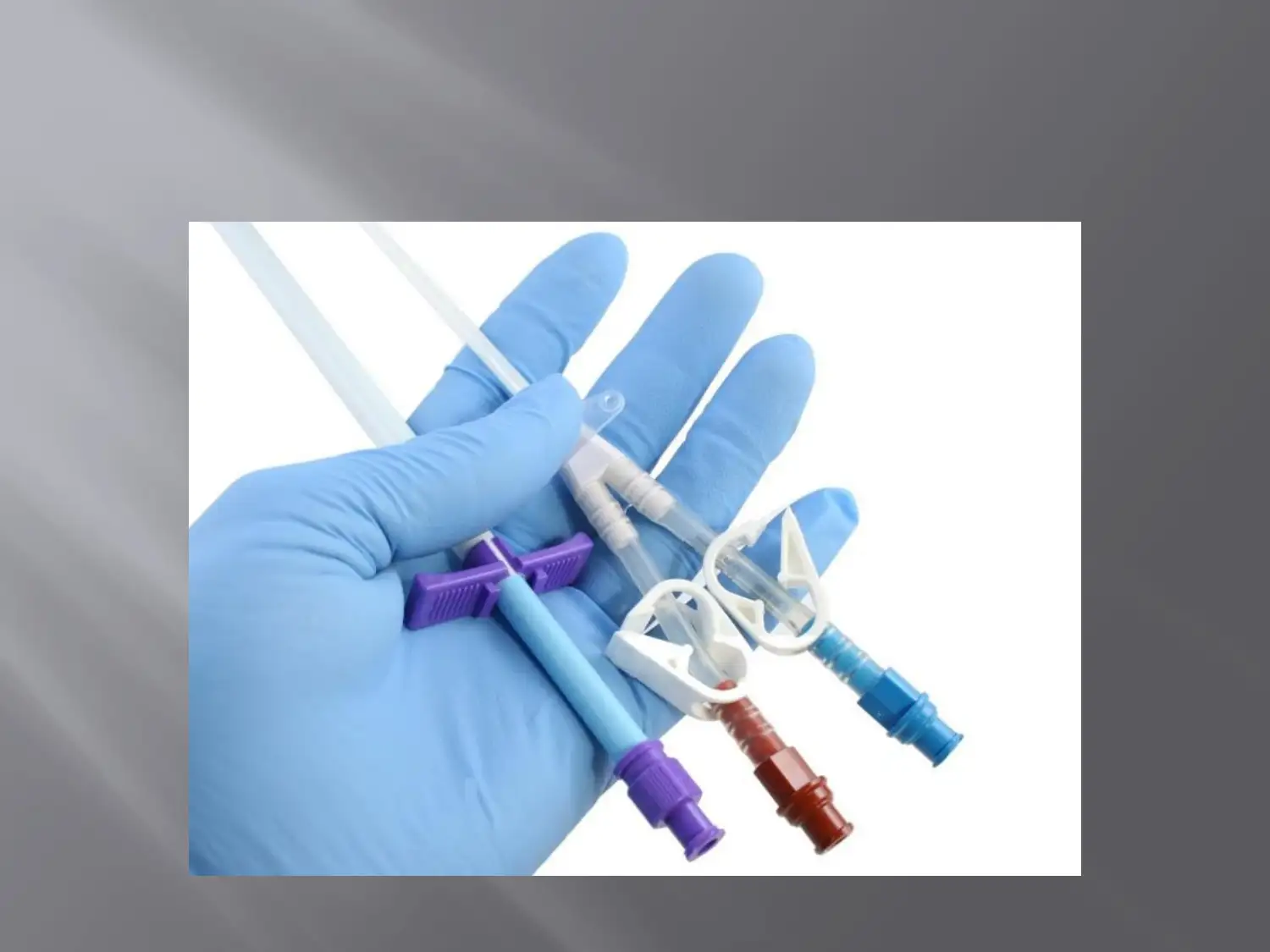
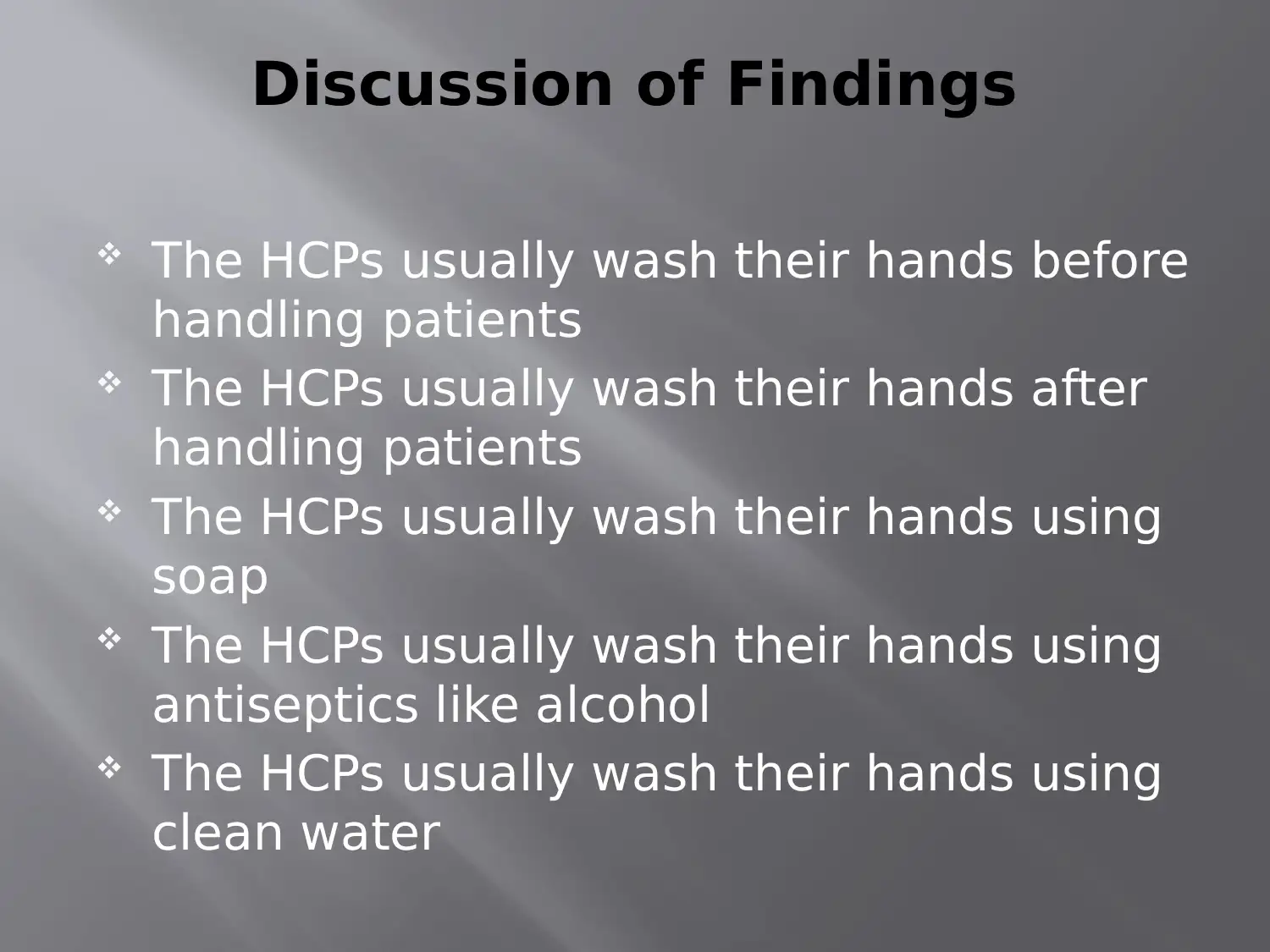
Discussion of Findings
The HCPs usually wash their hands before
handling patients
The HCPs usually wash their hands after
handling patients
The HCPs usually wash their hands using
soap
The HCPs usually wash their hands using
antiseptics like alcohol
The HCPs usually wash their hands using
clean water
The HCPs usually wash their hands before
handling patients
The HCPs usually wash their hands after
handling patients
The HCPs usually wash their hands using
soap
The HCPs usually wash their hands using
antiseptics like alcohol
The HCPs usually wash their hands using
clean water
Secure Best Marks with AI Grader
Need help grading? Try our AI Grader for instant feedback on your assignments.
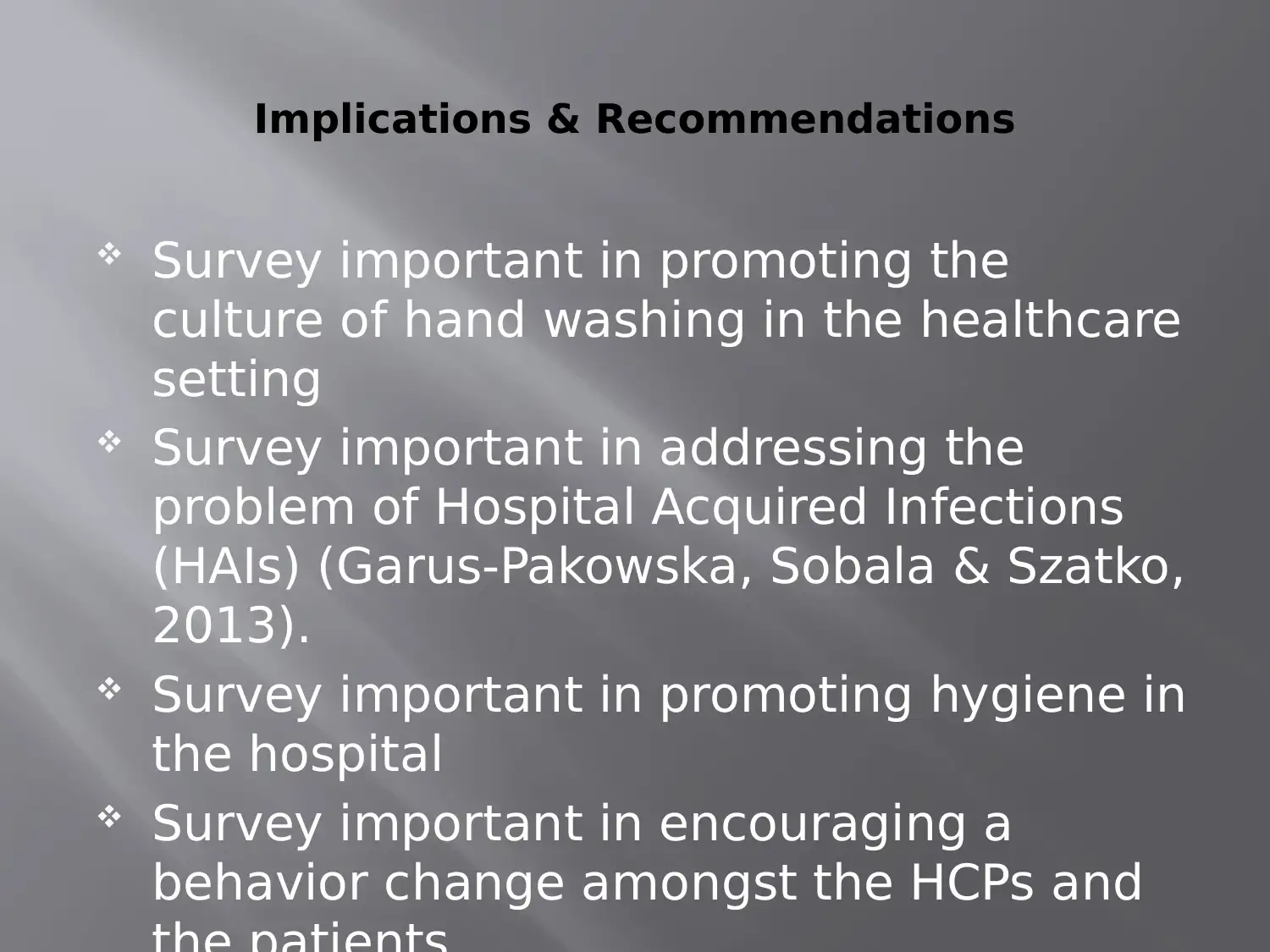
Implications & Recommendations
Survey important in promoting the
culture of hand washing in the healthcare
setting
Survey important in addressing the
problem of Hospital Acquired Infections
(HAIs) (Garus-Pakowska, Sobala & Szatko,
2013).
Survey important in promoting hygiene in
the hospital
Survey important in encouraging a
behavior change amongst the HCPs and
Survey important in promoting the
culture of hand washing in the healthcare
setting
Survey important in addressing the
problem of Hospital Acquired Infections
(HAIs) (Garus-Pakowska, Sobala & Szatko,
2013).
Survey important in promoting hygiene in
the hospital
Survey important in encouraging a
behavior change amongst the HCPs and
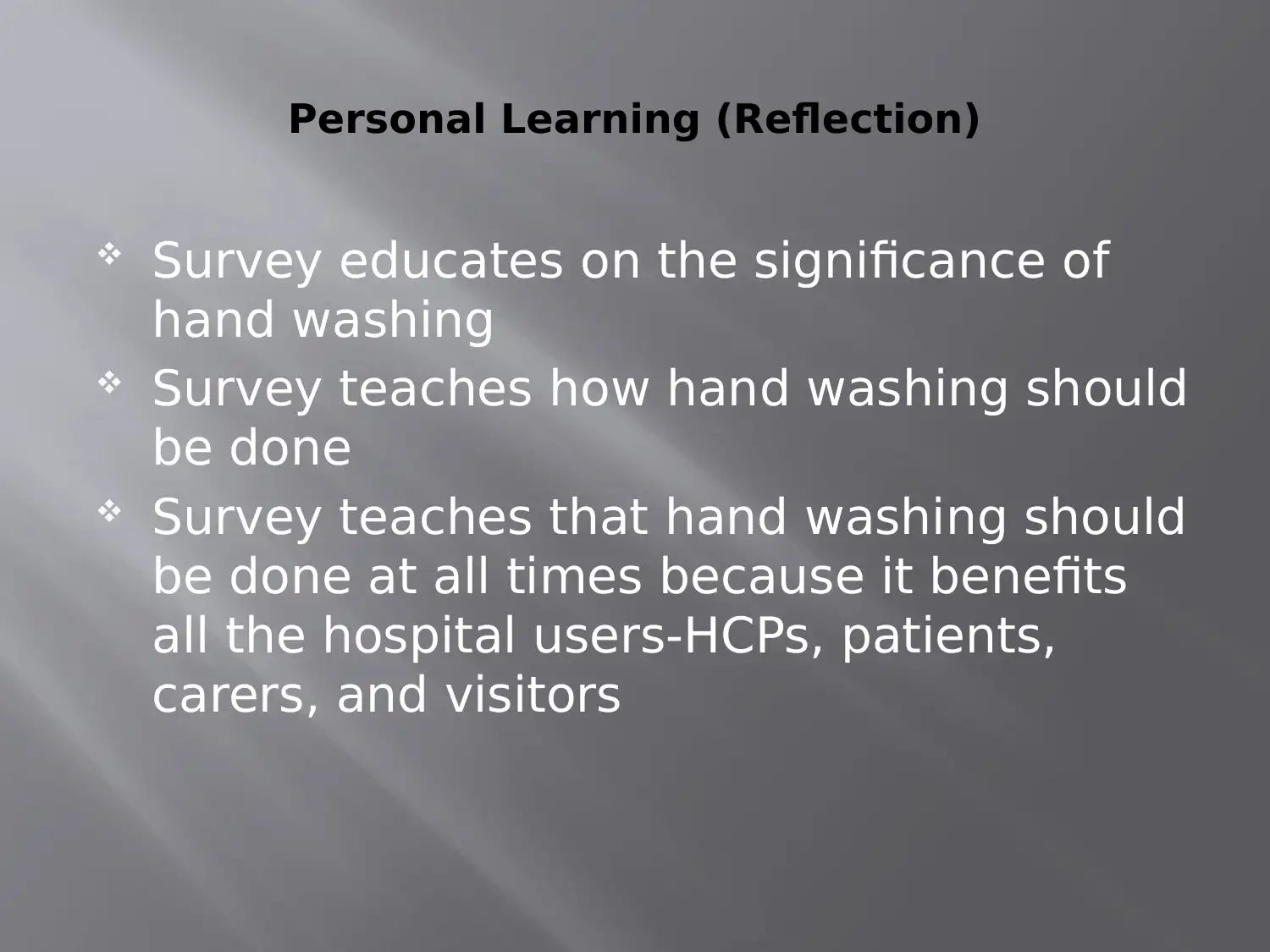
Personal Learning (Reflection)
Survey educates on the significance of
hand washing
Survey teaches how hand washing should
be done
Survey teaches that hand washing should
be done at all times because it benefits
all the hospital users-HCPs, patients,
carers, and visitors
Survey educates on the significance of
hand washing
Survey teaches how hand washing should
be done
Survey teaches that hand washing should
be done at all times because it benefits
all the hospital users-HCPs, patients,
carers, and visitors
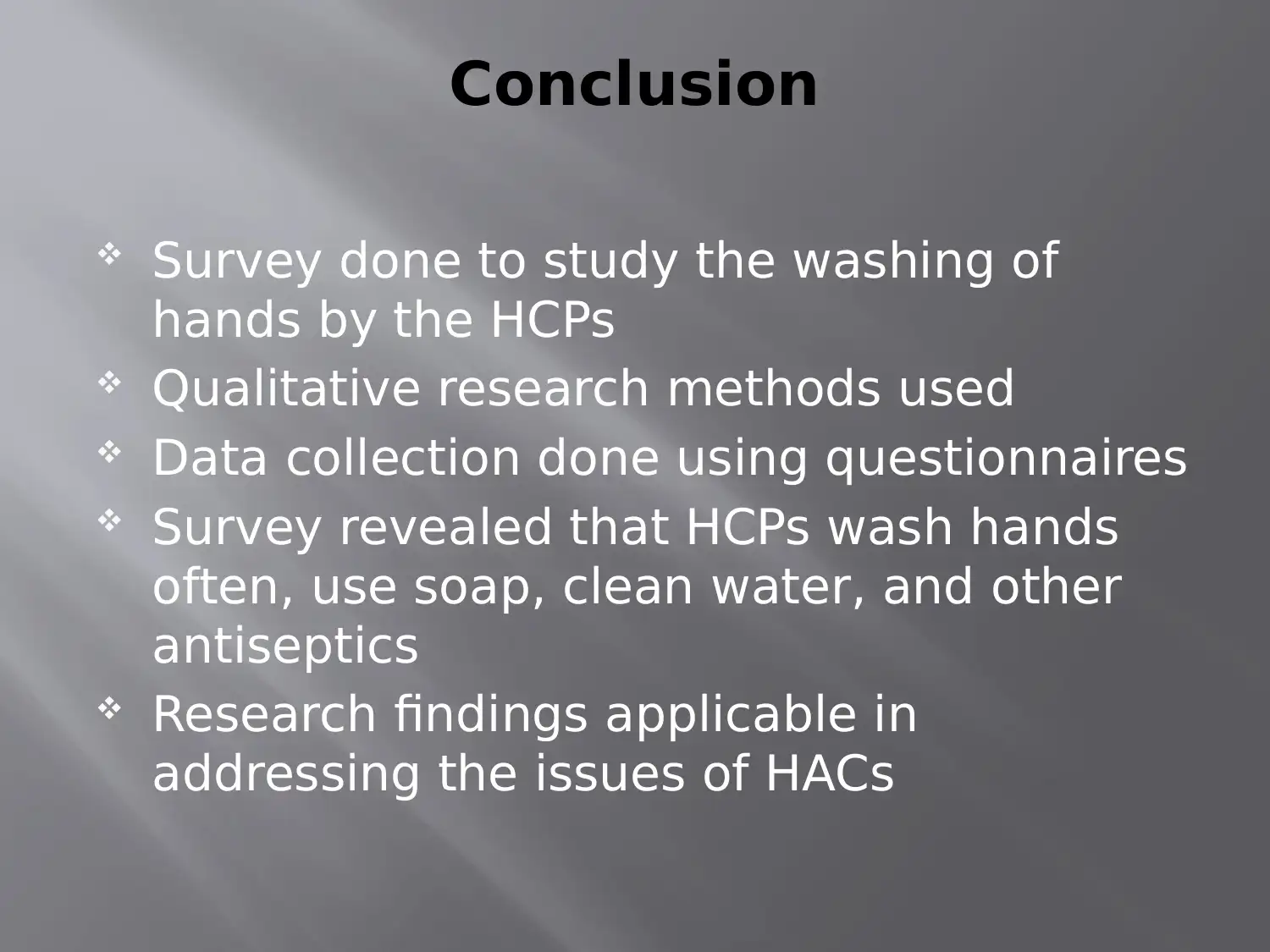
Conclusion
Survey done to study the washing of
hands by the HCPs
Qualitative research methods used
Data collection done using questionnaires
Survey revealed that HCPs wash hands
often, use soap, clean water, and other
antiseptics
Research findings applicable in
addressing the issues of HACs
Survey done to study the washing of
hands by the HCPs
Qualitative research methods used
Data collection done using questionnaires
Survey revealed that HCPs wash hands
often, use soap, clean water, and other
antiseptics
Research findings applicable in
addressing the issues of HACs
Paraphrase This Document
Need a fresh take? Get an instant paraphrase of this document with our AI Paraphraser
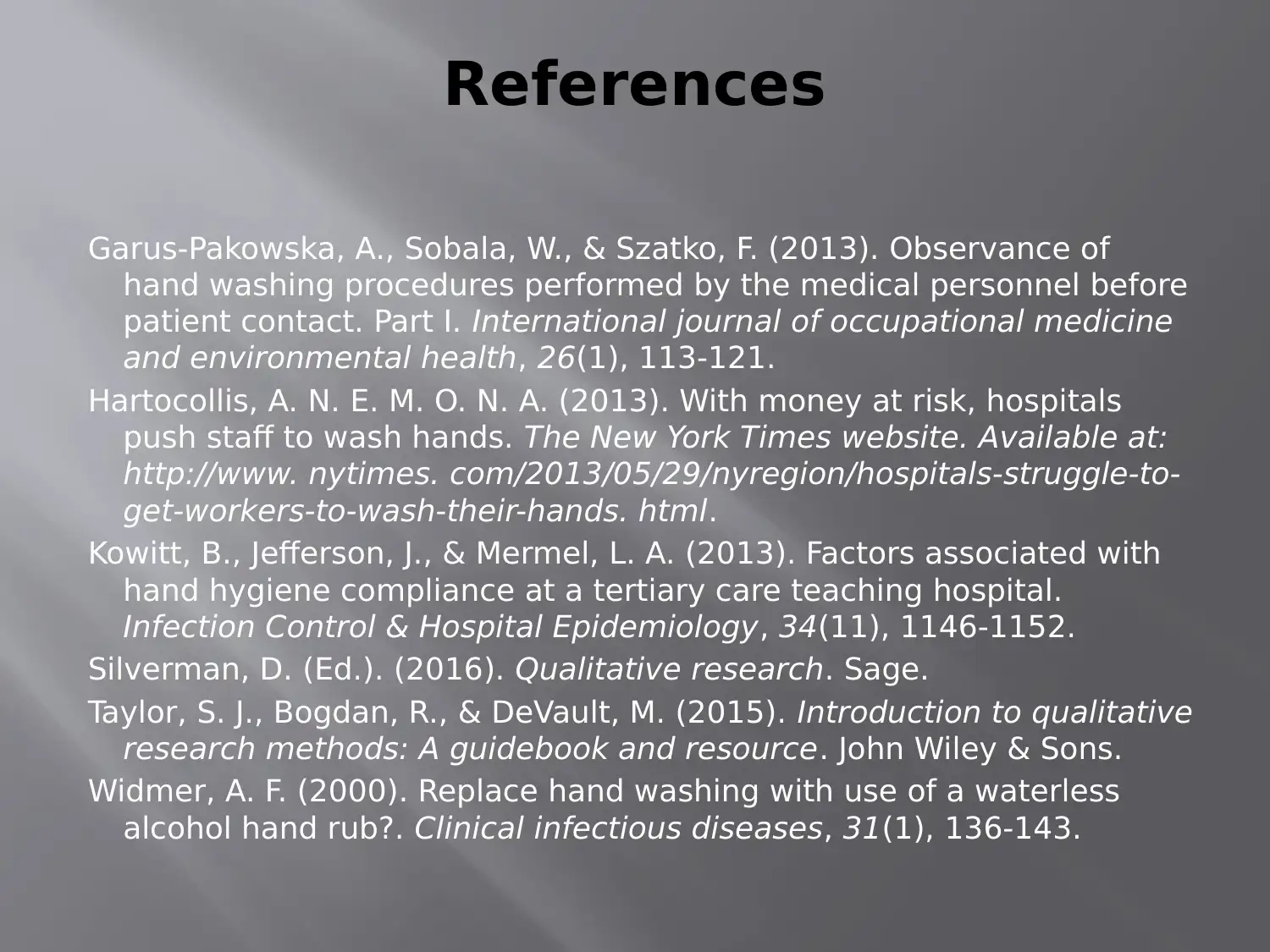
References
Garus-Pakowska, A., Sobala, W., & Szatko, F. (2013). Observance of
hand washing procedures performed by the medical personnel before
patient contact. Part I. International journal of occupational medicine
and environmental health, 26(1), 113-121.
Hartocollis, A. N. E. M. O. N. A. (2013). With money at risk, hospitals
push staff to wash hands. The New York Times website. Available at:
http://www. nytimes. com/2013/05/29/nyregion/hospitals-struggle-to-
get-workers-to-wash-their-hands. html.
Kowitt, B., Jefferson, J., & Mermel, L. A. (2013). Factors associated with
hand hygiene compliance at a tertiary care teaching hospital.
Infection Control & Hospital Epidemiology, 34(11), 1146-1152.
Silverman, D. (Ed.). (2016). Qualitative research. Sage.
Taylor, S. J., Bogdan, R., & DeVault, M. (2015). Introduction to qualitative
research methods: A guidebook and resource. John Wiley & Sons.
Widmer, A. F. (2000). Replace hand washing with use of a waterless
alcohol hand rub?. Clinical infectious diseases, 31(1), 136-143.
Garus-Pakowska, A., Sobala, W., & Szatko, F. (2013). Observance of
hand washing procedures performed by the medical personnel before
patient contact. Part I. International journal of occupational medicine
and environmental health, 26(1), 113-121.
Hartocollis, A. N. E. M. O. N. A. (2013). With money at risk, hospitals
push staff to wash hands. The New York Times website. Available at:
http://www. nytimes. com/2013/05/29/nyregion/hospitals-struggle-to-
get-workers-to-wash-their-hands. html.
Kowitt, B., Jefferson, J., & Mermel, L. A. (2013). Factors associated with
hand hygiene compliance at a tertiary care teaching hospital.
Infection Control & Hospital Epidemiology, 34(11), 1146-1152.
Silverman, D. (Ed.). (2016). Qualitative research. Sage.
Taylor, S. J., Bogdan, R., & DeVault, M. (2015). Introduction to qualitative
research methods: A guidebook and resource. John Wiley & Sons.
Widmer, A. F. (2000). Replace hand washing with use of a waterless
alcohol hand rub?. Clinical infectious diseases, 31(1), 136-143.
1 out of 20
Related Documents
Your All-in-One AI-Powered Toolkit for Academic Success.
+13062052269
info@desklib.com
Available 24*7 on WhatsApp / Email
![[object Object]](/_next/static/media/star-bottom.7253800d.svg)
Unlock your academic potential
© 2024 | Zucol Services PVT LTD | All rights reserved.




